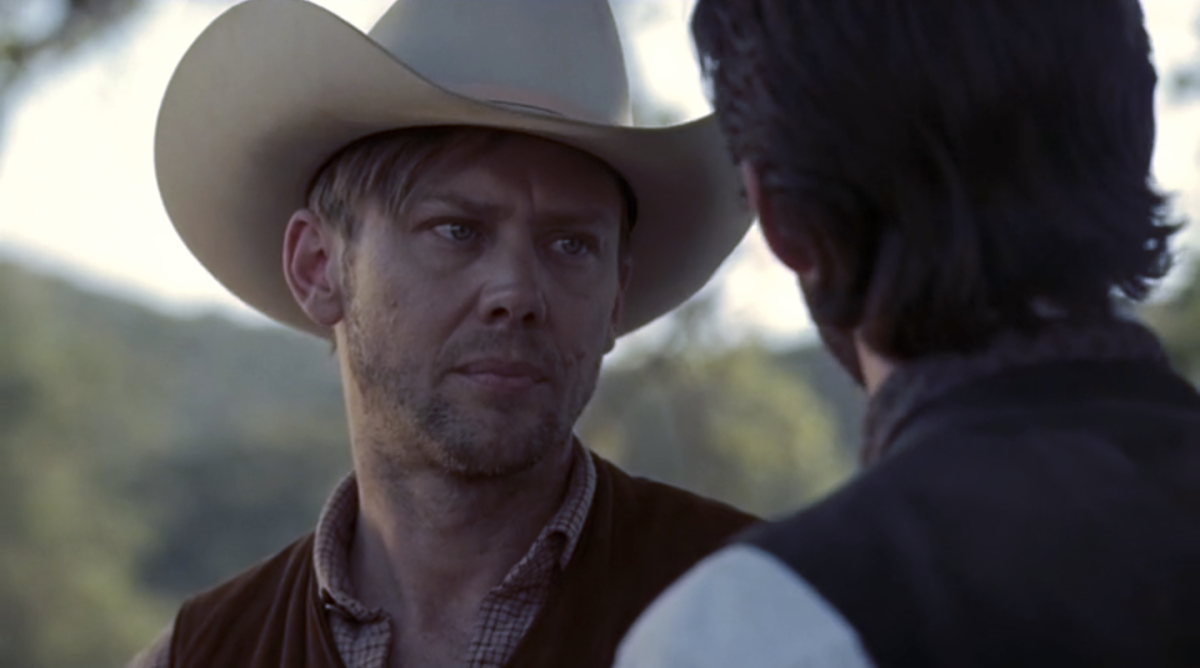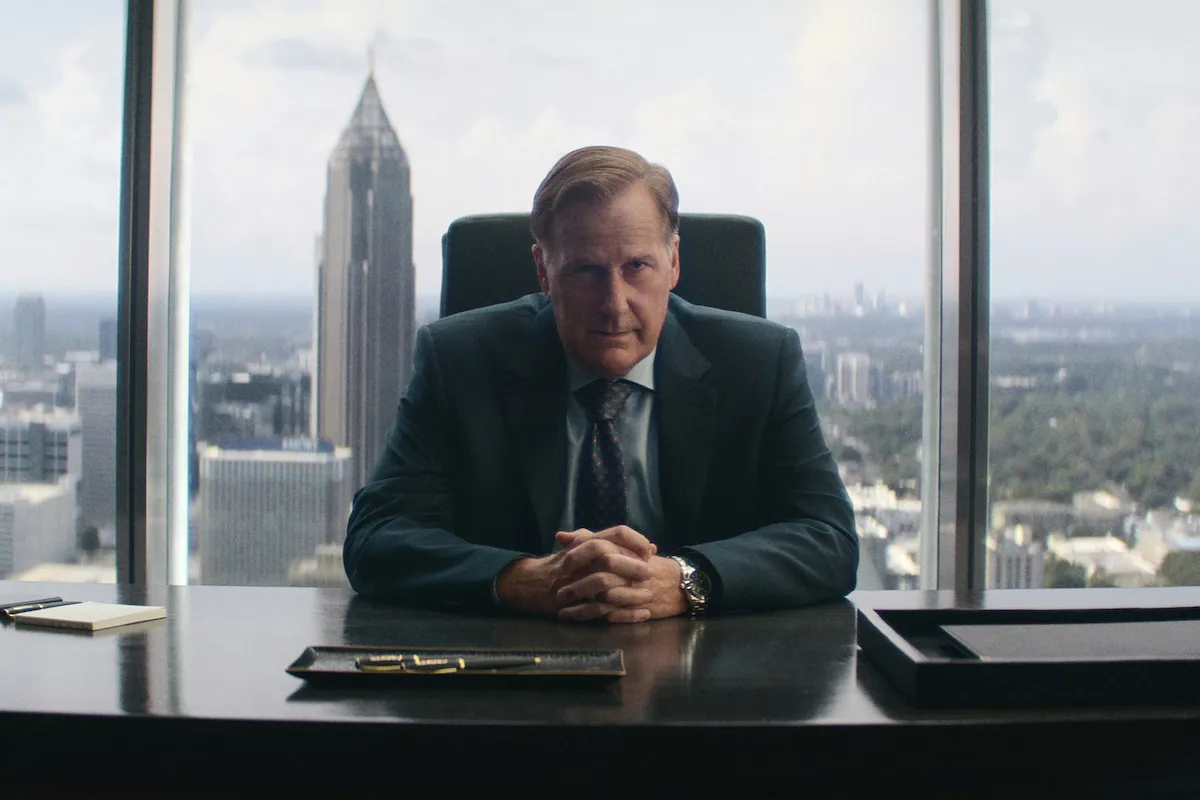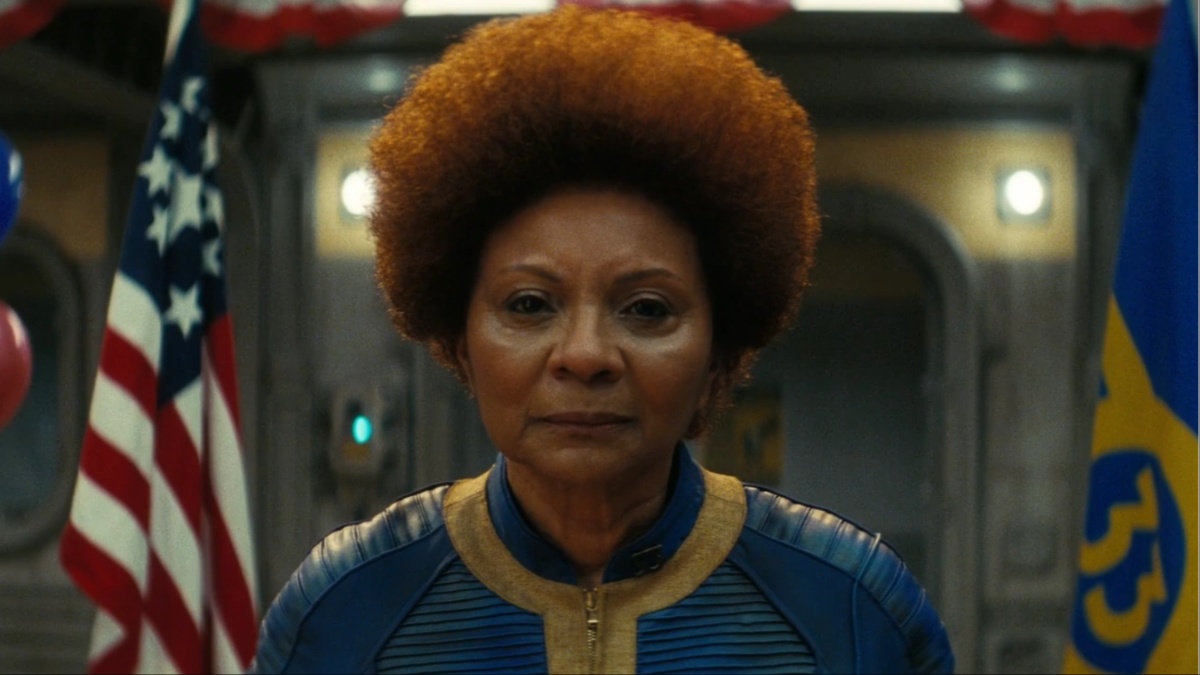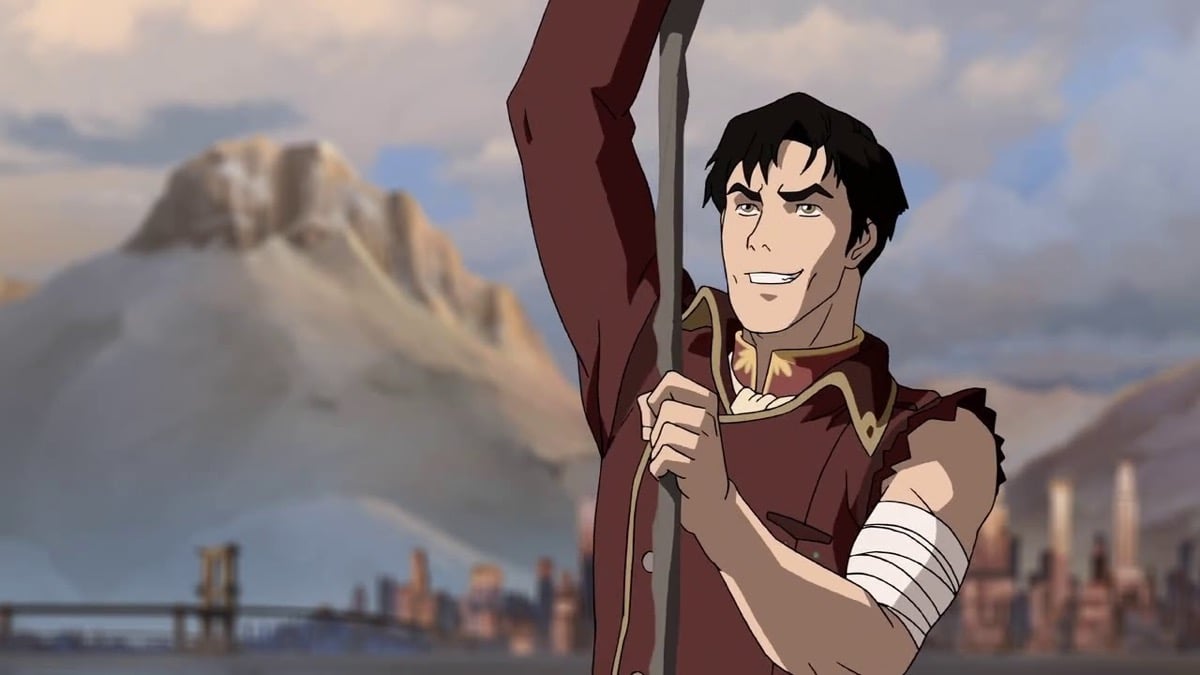Maddy and Teresa are back for their usual tag-team recap of Westworld. Maddy’s the Logan of the pair, who wants to pick holes in every little detail of the show, and Teresa’s the William, who’s optimistic about it all.
THE RECAP SECTION
Bernard is interviewing Dolores one-on-one again, in spite of having told Dr. Ford in the previous episode that he would reevaluate his own relationship to Westworld’s robots. He’s doing the opposite of that, here. Dolores is wearing her clothes, so we know this isn’t an officially sanctioned meeting.
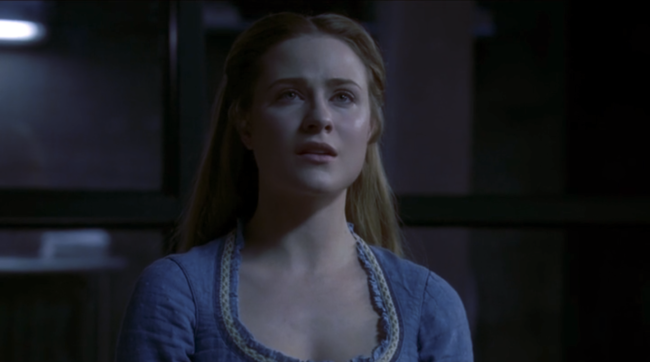
Bernard asks her to explain what happened to her at the end of her last loop; it’s the same storyline she’s lived time and time again, in which criminals attempt to kill her family and rape her – and, often, succeed in their attempts, if no one is there to stop them (Dolores has only recently gained the ability to use a gun). Bernard offers to erase these memories and remove Dolores’ pain. Dolores refuses, saying “the pain is all I have left” – the same thing Bernard said about the death of his own son in the previous episode. With a haunted look, Bernard asks who wrote these lines of dialogue for her. Dolores says she improvised the lines based on some of her other scripted dialogues. In this conversation, Bernard seems more and more as though he’s seeing Dolores as a person rather than a robot; he keeps asking her what she wants to do, rather than making the decision for her, which suggests he believes she has self-awareness and self-determination. He should be stamping that out of her, but he isn’t. Instead, he tells Dolores about the “maze” – calling it a “game” and a “secret” – the same journey that the Man In Black has sought throughout the episodes so far. Apparently, if Dolores can solve this maze, she’ll be “free.” Is Bernard helping Dolores to escape Westworld?
(Maddy: Could Dolores actually survive in the “real world”? Unlike, say, the robots in Ex Machina, I’m not sure Dolores has the ability to survive in the real world. It was pretty easy for me to root for the robots in Ex Machina to escape, but … in Westworld, I’m not so sure. The robots seem much more like children than adults, so setting them “free” seems negligent. Teresa: I think that “freedom” in terms of the hosts is more about control and autonomy than about location. It’s not necessarily about “letting them out” but about giving them control of themselves, or the park. If you go to discoverwestworld.com and type “violentdelights” in the “Access” box, you’ll get to the “back-end” of the Westworld site. Go to “Corp. Resources” and you’ll see a file called WestworldMesaHub.mp4, which shows you the company HQ. the way it’s built vertically instead of horizontally reminds me of a spoke in the wheel, with the park possibly surrounding it. Could the center of the maze be Mesa Gold? Or maybe it’s just Arnold’s decaying skeleton with a sign around its neck that says “THE CAKE IS A LIE.”)
Dolores wakes up; it’s daylight, and she’s lying in the desert. She discovers a pistol in her hand. She looks up to see William, smiling and offering her a mug of something to drink.
At the brothel, Clementine and Maeve make idle conversation about one of Clementine’s clients. Apparently, Clem let some guy skip out on the bill because she enjoyed her time with him so much. (Maddy: That particular line definitely plays into the “Westworld is a male fantasy” thing–I really enjoyed Emily Nussbaum’s recent New Yorker piece on that theme within the show. Teresa: And here I thought it was an awesome depiction of Hey, there are sex workers who actually enjoy being sex workers and choose that for themselves. Now, obviously the hosts in Westworld have no choice re: anything, but I thought it was awesome to see Clementine actually enjoy a well-endowed client, rather than the tired Woe is me, life as a prostitute is so demeaning and all I do is grit my teeth and get through it narrative.)
Meanwhile, Maeve lapses into a flashback to a scene when she watched Clementine die. The flashback continues through her own death; she watches as the robot handlers show up and clean off the hosts. Even though all of these memories should have been erased, Maeve seems to have remembered all of them, somehow. When Maeve jolts back to the present, Clementine is repeating the same line she said earlier about the client, seemingly unaware that she already said it.
Maeve heads upstairs to her bedroom and inspects her own body. She remembers getting shot in her abdomen, but she can’t find any scars. However, she does find a small spot of blood on the corner of one of her shirts. She sits at her bedside table and idly draws a picture of a person wearing a hazmat suit and a distinctive mask, like the ones worn by the robot handlers. She pulls up a floorboard to hide her drawing, and finds that she’s already made this exact same drawing several times before, although she doesn’t remember having done so.
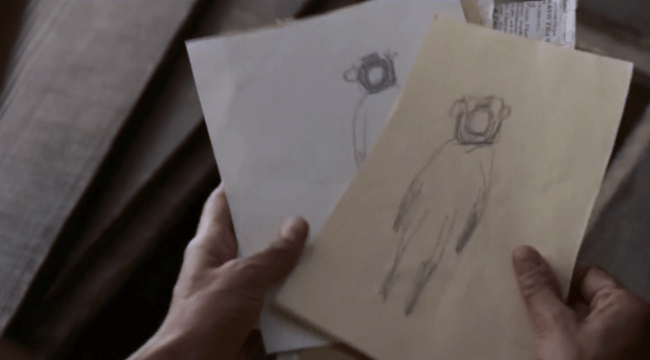
Elsie delivers a summary to Theresa about the stray host that she found in the previous episode—the one who buried himself in a hole in the ground, then killed himself as soon as his handlers found him. Bernard shows up midway through, at which point Theresa says she doesn’t trust them to figure out what went wrong with this host, and she’s going to let her own team do it. Elsie is angry, but Bernard goes along with it.
Elsie confronts Bernard privately afterwards and points out that they both know the hosts are acting weird. So why doesn’t Bernard want to tell Theresa about it? Bernard tells her to stop reading into things, and then points out that the constellation that the stray host kept carving into objects isn’t a constellation at all: “There are three stars on Orion’s belt. Not four.” So, what is the symbol, then?
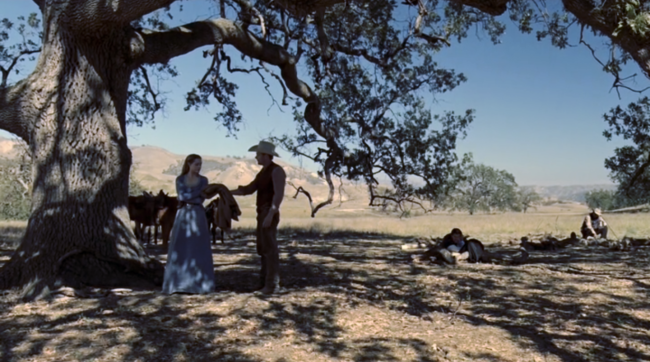
Back at William’s campfire, Logan and William are fighting about what to do next, again. They were supposed to be on a bounty hunter mission, before Dolores showed up and put a wrench in their plans. Logan theorizes that Westworld sent Dolores their way specifically because they guessed that William cared about her.
The Man in Black and Lawrence are still wandering the countryside, looking for the maze. The Man In Black is trying to follow the clue about rattlesnakes on the riverside, but killing snakes doesn’t seem to be leading anywhere. Then, he sees a woman bathing in the river; she has a snake tattoo curling all around her torso. She’s got a lot of cohorts with her, all of whom show up with guns raised to fend off the peeping toms. But the Man In Black isn’t scared; he knows he can’t be killed, anyway. He and the snake-lady make some flirtatious but dangerous conversation in which they both threaten to kill each other. He kills a couple of her cohorts, thereby strong-arming her into letting him tag along on her treasure hunt.
The robot handlers have noticed that Dolores has made a “big deviation from her loop” to go hang out with William. Doesn’t sound like this was planned.
William and Logan’s mission brings Dolores to the same town where Lawrence’s family got killed (Las Mudas). Dolores meets Lawrence’s daughter; their brief conversation triggers a flashback for Dolores, but this time, it’s a flashback to what appears to be Dr. Ford’s new storyline about the creepy church. When Dolores snaps back to the present, she sees that the girl has been drawing a maze in the dirt—the same maze that the Man In Black found on a host’s scalp. While Dolores is looking at the map on the ground, the little girl disappears and a different man shows up, trying to convince Dolores to go back to her ranch, saying her father must be waiting for her. Dolores snaps back that her father is dead and she’s never going back. The man insists, grabbing Dolores’ arm roughly. Williams interrupts the pair, saying Dolores isn’t “lost,” she’s accompanying him. The man leaves them alone. Williams tells Dolores they got a lead on the criminal they’ve been chasing, and says she doesn’t have to come with them, but she wants to go.
That night, William asks Dolores what she plans to do next. She has no idea. She shares a story about cattle abandoning the herd, and how by wandering, they ended up “escaping the slaughter.” When she looks up at the moon, she flashes back to seeing the bright lights of the robot handlers, cleaning her up after a “slaughter.”
At the Man In Black’s campfire, another human guest comes up to him and tries to make conversation with him about the real world. Apparently, the Man In Black owns a “foundation” that does charity work, and this guy wanted to put forth his thanks. In response, the Man In Black threatens to kill him and says, “this is my fucking vacation.” Then, the MIB pivots and talks to the Snake-lady, offering to get her treasure if she’ll tell him about her tattoos in exchange. She wonders why he cares. He asks her if she knows about Arnold, the “original settler” of Westworld. She doesn’t seem familiar with any of it, or with the map of the maze he shows her, but she’s intrigued.
The treasure is inside a prison, so the Man In Black and Lawrence have to get themselves arrested first in order to get inside. The Man in Black gifts some cigars to one of the sheriffs who arrests them; that’ll probably come back later. Turns out the Man In Black’s cellmate is also a misanthropic philosopher type, albeit a robot one rather than a human one. We also learn that the Man In Black’s cigars are actually explosives, not ordinary cigars; he uses one to blow up the lock on his cell door (after requesting a “pyrotechnic effect” from Westworld HQ by signaling with a lit match). The other cigar that he gifted to the sheriff blows up too, killing the sheriff who had unwittingly begun to smoke it.
Meanwhile, Lawrence is about to get executed by a firing squad, but the MIB saves him… to Lawrence’s chagrin. The anti-hero squad heads back to camp and the Snake-lady tells the MIB her backstory. Apparently, her nemesis is Wyatt, the same new bad guy that Dr. Ford invented for Teddy. (Maddy: Perhaps he’s not new, just getting repurposed for multiple storylines? Based on what we know so far about him, he seems to be a cult leader, probably related to the creepy church that the robots keep seeing in visions.)
Back at Sweetwater, a group of cultists is walking silently through the town. Maeve and several other bystanders watch. One of the kids in the cult group drops a doll that looks exactly like the robot handlers. Maeve sees the doll, grabs it, and runs to the child, demanding answers. The cultists don’t respond, but another onlooker tells Maeve that the doll is “part of their so-called religion.” (Maddy: So… did Dr. Ford invent a cult for the robots that allows them to worship their own handlers as deities? It seems like the “Dr. Ford makes himself into a literal god” theory is playing out nicely here.)
Theresa and Bernard share another post-coital scene. As usual, they talk about work rather than anything personal. (Maddy: Even when these two are being charming towards each other, their relationship still seems more like one of convenience rather than chemistry. Teresa: I’ve gotta say, it makes me really happy to see a non-marital sexual relationship between two older people. It shouldn’t be, but it’s such a novelty that Theresa is age-appropriate for Bernard)
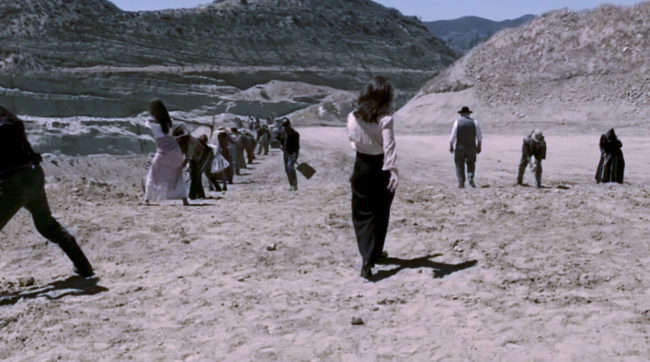
Theresa confronts Dr. Ford about all the resources he’s using up on his new storyline. As they walk through the worksite, we see lots of people – robots? – working on building the new structures. (Maddy: Probably robots. Nothing cheaper than unpaid labor… This sequence seems to be intentionally evoking the robots-as-a-metaphor-for-slavery theme. Teresa: Yup. Those were apparently agave fields they were working in, according to the show’s website, but cotton plants would not have gone amiss.) Theresa and Dr. Ford share a meal together inside, away from the laborers. Dr. Ford says he doesn’t think she likes her job. She admits, at length, that she doesn’t. Dr. Ford also admits that working at Westworld can wear down one’s sense of hope; in the beginning, “we made a hundred hopeful storylines, but no one took us up on them.” (Maddy: I continue to find Westworld‘s characterization of humanity to be bizarre. Yes, a minority of human visitors will have interests like Logan. But surely there are a lot of people like William out there, too? More Williams than Logans, I think, who fancy themselves to be “Nice Guy” heroes? Teresa: It’s also interesting to note that the hopeful storylines were Dr. Ford’s idea. Despite Arnold being “on the side of the hosts,” Ford is the one who believed that people would be into hopeful storylines, and he lost the bet) As a show of power, Dr. Ford briefly pauses all of the robots and laborers around them; one robot stops midway through pouring some wine, pouring it all over the floor. Theresa looks spooked; she lights a cigarette and asks him what happened to Arnold. Dr. Ford’s response is ominous. (Maddy: I really think he killed Arnold. Teresa: what if Dr. Ford IS Arnold? Dun-dun-DUUUUUUN!) Dr. Ford also reveals that he knows Theresa is sleeping with Bernard. The big takeaway from his creepy monologue: “please, don’t get in my way.”
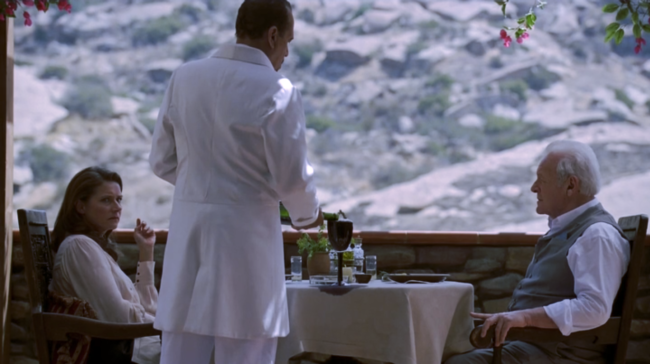
William is about to face off against the bounty hunter; he tells Dolores to stay back, although she wants to come along and use her newfound shooting skills. William and the guys rush into the farmhouse and kill everybody inside. (Maddy: Who even are these guys? Interchangeable bad guys?)
Lawrence and the MIB come across one of Wyatt’s callsigns: an almost-dead body strapped to a tree. It’s Teddy! The Man In Black cuts him down from the tree even though Teddy asks to be put out of his misery. The MIB tells him that there’s nothing but misery for him.
Logan and William head back with their one living captive to complete their quest-line; their captive tells them that his boss will pay twice as much as the bounty on his head. Logan likes the sound of that, so he turns on the group and decides to head off on that new quest-line. William is horrified–as is Dolores, who doesn’t understand Logan’s cavalier attitude towards morals. Logan, meanwhile, refers to the robots as robots to their faces. (Maddy: Are the robots programmed to ignore words like “robot” getting used around them? They probably should be… Seems like it would solve some problems. Teresa: part of the “dissonance theory” of the title. But yeah, I’d imagine the hosts ignore that the same way they can’t process things like modern photographs) Logan tries to encourage William to “go black hat” and become destructive alongside him. Bizarrely, William agrees to go along with it. (Maddy: I guess the power of peer pressure, and the fact that Logan is William’s future brother-in-law—and, it’s implied, William’s upcoming marriage is more about money than love—play a role in William’s downfall here.)
Snake-lady and her cohorts show up in Sweetwater for a shoot-out. We saw all of this happen in the pilot episode—but this time, the shoot-out ends differently. When Hector (the Man In Black’s cellmate) gets to the brothel, Maeve waylays him and brings him up to her bedroom for a chat. She says she’ll give him whatever’s in the safe (which is probably whatever treasure he steals every time he shows up for this storyline) if he tells her more information about the figures that she keeps drawing. He calls it a “shade,” saying “they were sent from Hell to oversee our world.” Maeve tells Hector she’s been seeing visions of them. He says it’s a “blessing from God to see the masters who pull the strings.” Maeve wants him to cut her and see if the results give her a scar; he refuses at first, but eventually, he complies and stabs her a few times, at her request. Inside the wound, she finds a bullet. She seems to interpret this as a sign that she is immortal, and that nothing she does matters. After this realization, she gives Hector a desperate kiss. Carpe diem!
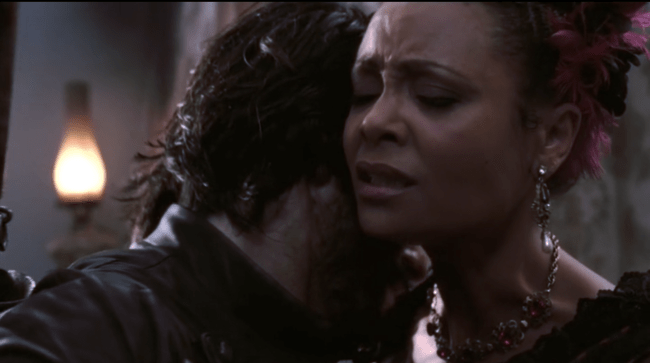
THE OPINION SECTION
Maddy: Is it just me, or have these episodes gotten continually less violent and less rape-y as the season has gone on? Not that it’s a bad thing—I just think it’s interesting that the pilot episode started out with so much casual nudity and dehumanization of the robots, and by the time you get to episode four, we barely see the robots naked at all. There were many moments in this episode when the camera intentionally cut away rather than showing us the robots getting shot. That might just be due to budget constraints—perhaps Westworld blew their flashy torture and gore budget on the pilot—but I also think it’s a sign about how they wanted to market this show.
I also realize that most critics got a copy of all four of the first episodes before they reviewed the show, whereas I only got to see the pilot episode before I wrote my first review, and now that I’ve finally gotten through to episode four, I understand better why people liked the show more than I did. The pilot episode feels like a much more reductive version of this show, and I still think it was a mistake for Westworld to start off the way it did, but I’m happy to continue to be the only person with that unpopular opinion.
I still think the show is a stronger and more enjoyable watch when it focuses on story rather than on the exploitative aspects of the Westworld theme park. I get that we’re supposed to believe that the average customer acts like Logan, and just wants to “fuck and kill,” but I’m still not sure I buy it. I was hoping we’d see more of that tension from William going forward and that he would continue to question Logan, but instead, he seems to be going along with it. That’s less interesting to me, so I hope that in future episodes, Westworld continues to let William be the audience stand-in who questions the world around him. I don’t really want to see him become the Man In Black, although I do realize that’s a very popular fan theory.
Dr. Ford’s idea to create a religion for the robots is a clever one—very Battlestar Galactica. At first, the robots had been programmed to believe that their memories of their handlers were nightmares, but explaining them away as religious visions might be a “safer” way to maintain control over the robot population. But … why bother? Why not just keep erasing their memory logs? I’ve made a lot of guesses about Ford’s motivations since the pilot, and I’ve been wrong pretty consistently, yet I can’t help continuing to guess. That’s something in the “pro” column on this show for me, is that Dr. Ford’s machinations have kept me interested.
The show still has plenty of weak points for me, though–like, is it just me, or do Bernard and Theresa have no chemistry? Why are they risking their jobs to be together? And, of course, I still think the overarching conceit of the show is, well, silly. If robot technology is as advanced as it appears to be in Westworld, how does that affect the entire rest of the world in which these characters live? I’m worried that I don’t want the answer to that question, because I’m not sure Westworld has completely figured out all of its sci-fi trappings. I already have a lot of questions about how guns and explosives work in the theme park, because none of it makes sense. Why do bullets have the capacity to pierce robot flesh, but never humans? Originally I thought that maybe all of the guns didn’t actually work, and that getting shot with a bullet would trigger a death scene and blood for a robot but that the bullet wouldn’t really pierce their skin… but now we’ve seen a literal bullet inside of Maeve’s body. So, clearly, these bullets are piercing robot skin, but for some reason, they bounce off human skin like paintballs. So, are the robots just super fragile then? Because they don’t seem to be; they can take a pretty strong beating from humans. Are we supposed to believe that the guns are programmed to behave differently depending on where they’re directed? Because, as Westworld has already shown us, programming has bugs. People would be dying constantly in this theme park. I get the sense the show is working up to a point where humans start dying, so as to make it a big deal once it starts happening, but … I already don’t buy it, because I feel like there’s no way the mechanics of this theme park would even work, so I have to just force myself not to think about it when I watch this show. I feel like the further we get outside the theme park, the larger those sci-fi plot holes are going to get.
That said, there’s just no way that Westworld is going to be able to remain inside the world of its theme park for the entire run of the show. We’ve already seen multiple repetitions of the same storylines even within these four episodes, so I’m sure we need to go in a new direction next, or at least add more layers to the story. I have some predictions for how the first season might end, but Westworld needs to last a LOT longer than that. HBO has said that they’ve already got five seasons worth of story planned out for Westworld. I can’t imagine that all five seasons will take place within this one theme park, so perhaps eventually, we’ll get to see the rest of the world outside of it… and the ways that robots might exist in “the real world.” Perhaps we might end up with more of a Battlestar Galactica plot-line after all, with some serious robot-vs-human wars. But, then again, I’ve been wrong about every other prediction I’ve made so far, so I could be wrong about this too. Maybe we’ll stay in the theme park for all five seasons. I just hope they can find a way to keep that interesting, ideally without going back to the ol’ egregious rape-and-torture well again.
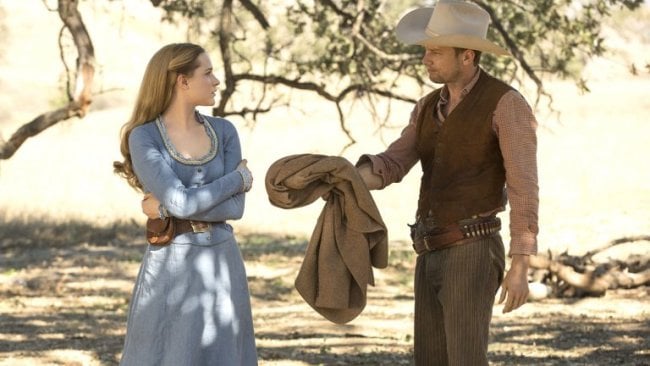
Teresa: I love how this episode managed to dissect and connect themes of love, death, and freedom. When Bernard has his conversation with Dolores and asks her where she got her response regarding erasing her memory of the death of her parents, she said that she was using an adapted response one of her programmed love scripts. It was interesting to me that the words she would use to describe how love feels are the same she would choose to describe loss, and indeed those two things are often tied together.
Freedom and death seemed to be connected in two instances in the episode that I thought were really interesting. First, with regard to the MIB, whose purpose in finding and solving the maze is in finding “real stakes.” The one thing that can’t happen in Westworld is that human guests can’t die — except, apparently in the middle of the maze. The question is: is the MIB looking to die? Is he simply on vacation looking for thrills? Or does his “freedom” finally arrive when he is able to die in this game.
I know a lot of people are still invested in the William Being the MIB in the Past theory, but consider if you will the things we’ve learned about Arnold: he co-created the park with Ford and was always on the hosts’ side. However, as Ford says in this episode, he didn’t believe that humans were interested in hopeful storylines. We know there was a rift between the two men, and that Arnold “died in the park.” How literal that “death” was remains to be seen, but considering how the park went on without him, and how we’ve seen Ford controlling the hosts in the environment and at-will, it’s not difficult for me to imagine that the MIB is Arnold trying to shut down the park to stop what’s happening to the hosts, and The Maze is the way to do that. So, why has the MIB been engaging in so much mistreatment of the hosts in pursuit of The Maze? Well, if the game is designed to offer additional challenges to players willing to “go further,” he’d have to to get to the more difficult levels. Meanwhile, he talks to the hosts as if they’re his friends. In other words, don’t hate the player, hate the game. I think it’s highly possible that this is Arnold trying to shut Ford down, which could lead to his very-real death after his “death” in the park. After all, the MIB outright says to Lawrence, “What if I told you I’m here to set you free?” This is his one story left to tell.
The other instance of connection between death and freedom comes from Maeve. Having found a bullet she suspected was there in her abdomen from having been shot in the past, she’s confirmed that she’s died before, and will die again, but it’s through this dying and being reborn over and over that she will eventually find the knowledge she seeks. For Maeve, her freedom lies in dying. My hope is that she and Dolores beat the MIB to the middle of The Maze. If anyone should be responsible for the hosts’ freedom, it should be the hosts themselves.
I couldn’t help but think about the stray host from “The Stray” who self-sabotaged. Could it be that that host was also onto something and was trying to continue dying to find out more? Were his etchings drawings similar to Maeve drawing the people in hazmat suits, reflecting another aspect of our real world?
The scene between Dr. Ford and Theresa on the agave plantation was hands-down the best scene in the episode, and it gave me goosebumps. Also, hearing what Dr. Ford said and listening to the words he chose was very interesting. For example, when Theresa asks him what happened to Arnold, he very pointedly says that Arnold went mad, but that he did not. That he sees things clearly. Thing is, people who go mad rarely think they’re going mad, and if anyone looks like they’re going mad, it’s Dr. Ford in this chilling moment. This also leads me to believe that Ford and the MIB are destined to go head-to-head as Ford and Arnold, settling old scores. Well, that and the “scenes from next week” when we see them having a chat! EEK!
I love the religion aspect being brought to Westworld, as I love when religion and sci-fi combine. I loved it on DS9, on Battlestar Galactica, on Lost, and I love it here. Now, here’s where the timelines get fuzzy and might throw everything into chaos. In “Chestnut,” we see Dr. Ford see a church steeple sticking up out of the ground. In his conversation with Theresa, we see the hosts working on his new storyline (that’s “not a retrospective”), only to snap his creator fingers and have a building shoot up from the ground. He goes on and on about how he’s known several others like Theresa who’ve come and gone. It seems as though the church has been there before, meaning that everything to do with Wyatt’s unorthodox beliefs, the “shades” and their believers, Maeve getting closer to the truth, and even Dolores looking for The Maze has all happened before (and it will all happen again. So say we all). However, Ford insists that he’s not doing a retrospective. So, either he always says that to whomever the “new Theresa” is, or the church is in the present, and is perhaps being built in secret underground, and he raises it only when it’s ready to be seen? Theory: Wyatt, who “goes by many names,” is either a stand-in for Ford, or was Ford once upon a time.
Either way, I’m fascinated by the idea of Ford playing God, and what God might really mean to the hosts. I think that religion is definitely being used to control the hosts, but I also believe that Ford is setting all this up…just to see what they’ll do. He’s still a scientist, after all.
Lastly, I just need to say that if Evan Rachel Wood and Thandie Newton aren’t both nominated for Emmys in the Best Actress in a Drama category for 2017, we live in a garbage world made of hot garbage.
Westworld continues to be thought-provoking, reveals its plot beautifully, and has gotten increasingly personal and character-focused despite the “mystery box” set-up, which is the best of all possible worlds.
(images via screencaps)
Want more stories like this? Become a subscriber and support the site!
—The Mary Sue has a strict comment policy that forbids, but is not limited to, personal insults toward anyone, hate speech, and trolling.—
Follow The Mary Sue on Twitter, Facebook, Tumblr, Pinterest, & Google+.



